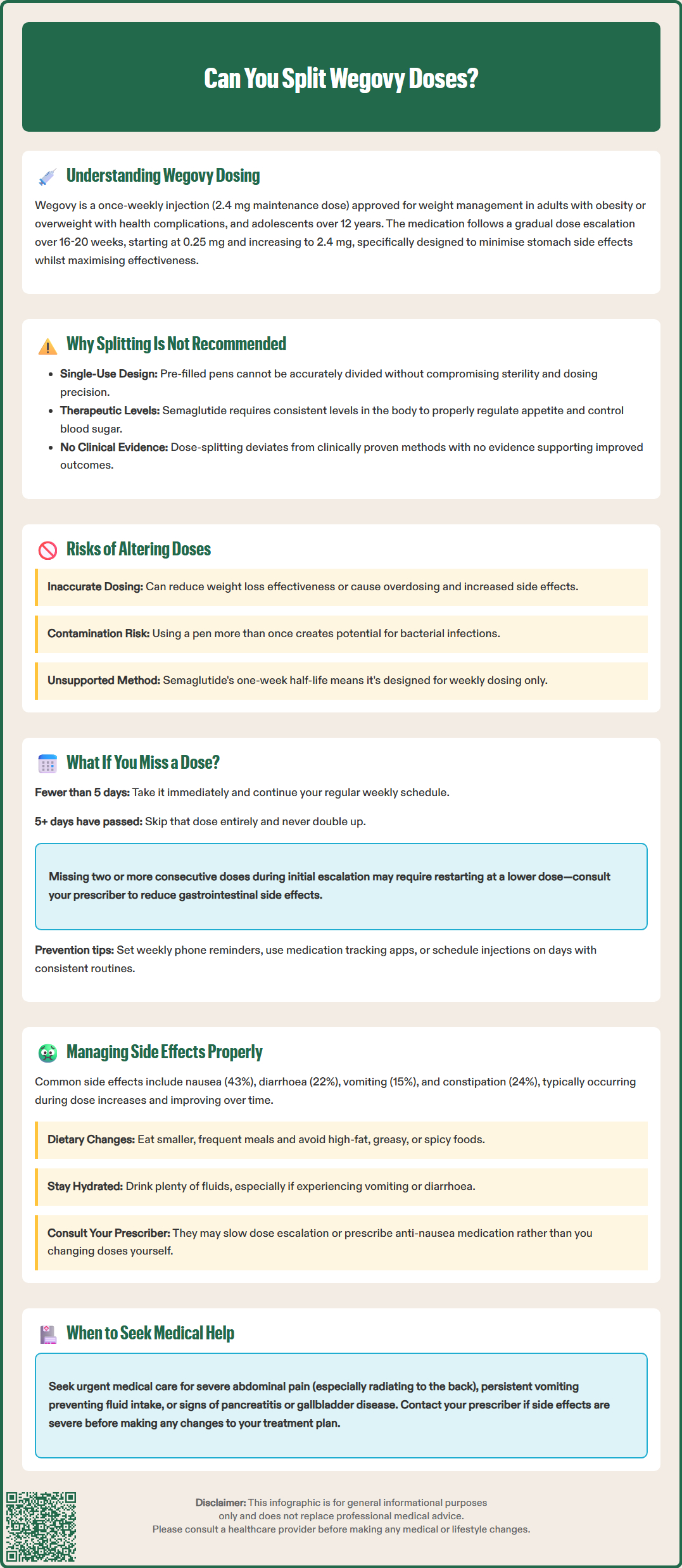
Splitting Wegovy doses is not recommended and is not supported by clinical evidence or MHRA guidance. Wegovy (semaglutide 2.4 mg) is a once-weekly GLP-1 receptor agonist licensed in the UK for weight management in adults with obesity or overweight with comorbidities. The pre-filled, single-use pens are engineered to deliver precise doses and cannot be safely or accurately divided. Attempting to split doses compromises medication sterility, dosing accuracy, and treatment efficacy. The carefully designed dose escalation schedule—from 0.25 mg to 2.4 mg weekly over 16–20 weeks—is based on extensive clinical trials to minimise gastrointestinal side effects whilst optimising therapeutic benefit. Patients experiencing side effects should consult their prescriber rather than self-adjusting their regimen.
Quick Answer: Splitting Wegovy doses is not recommended as the pre-filled pens are single-use devices that cannot be safely or accurately divided, and dose-splitting is not supported by clinical evidence.

Mounjaro® is the most innovative GLP-1 medication proven to dramatically curb appetite, hunger, and cravings to help professional men achieve substantial weight loss.
Start Here
Wegovy® is a weekly injectable GLP-1 medication with proven effectiveness in reducing appetite, hunger, and cravings to help busy professionals lose significant weight.
Start HereWegovy (semaglutide 2.4 mg) is a once-weekly subcutaneous injection licensed in the UK for weight management in adults with obesity (BMI ≥30 kg/m²) or overweight (BMI ≥27 kg/m²) with at least one weight-related comorbidity. The medication is also licensed for weight management in adolescents aged 12 years and above with body weight above 60 kg and obesity. Wegovy is supplied in pre-filled, single-dose pens designed to deliver a precise amount of semaglutide. Each pen contains exactly one dose and is intended for single use only.
The dosing schedule for Wegovy follows a carefully designed escalation regimen, starting at 0.25 mg weekly and gradually increasing over 16–20 weeks to the maintenance dose of 2.4 mg weekly (or 1.7 mg if 2.4 mg is not tolerated). This titration schedule has been established through extensive clinical trials to minimise gastrointestinal side effects whilst optimising therapeutic efficacy. The MHRA-approved dosing schedule is not arbitrary—it reflects the pharmacokinetic profile of semaglutide and the body's adaptation to the medication.
Splitting Wegovy doses is not recommended and is not supported by clinical evidence. The pre-filled pens are engineered as single-use devices and cannot be accurately divided. Attempting to split doses by administering partial injections or dividing the contents between multiple injections compromises both the sterility of the medication and the precision of dosing. Furthermore, there is no official link between dose-splitting and improved outcomes or reduced side effects.
The glucagon-like peptide-1 (GLP-1) receptor agonist mechanism of semaglutide requires consistent therapeutic levels to exert its effects on appetite regulation, gastric emptying, and glucose homeostasis. Deviating from the prescribed regimen means using the medication in a manner not supported by clinical evidence and not in accordance with the MHRA-approved Summary of Product Characteristics (SmPC).

Attempting to split or alter Wegovy doses carries several significant risks that can compromise both treatment safety and effectiveness. The primary concern relates to dosing accuracy—the pre-filled pens are calibrated to deliver a specific volume, and any attempt to administer a partial dose introduces substantial margin for error. Inaccurate dosing may result in subtherapeutic drug levels, reducing weight loss efficacy, or inadvertent overdosing, which increases the risk of adverse effects.
Contamination and infection risk represent serious safety concerns when manipulating single-use injection devices. The Wegovy SmPC explicitly states that pens are for single use only and must not be reused. Once a pen has been used, the sterility of the remaining contents cannot be guaranteed. Bacteria can enter through the needle insertion site, and storing a partially used pen—even under refrigeration—creates an environment for microbial growth. Subsequent injection of contaminated medication can lead to injection site infections, abscesses, or systemic infection.
From a pharmacological perspective, semaglutide has a half-life of approximately one week, which is why it is dosed weekly. Splitting doses into smaller, more frequent administrations is an off-label use that has not been studied in clinical trials. The clinical trials that established Wegovy's safety and efficacy profile used the approved once-weekly dosing schedule—deviating from this regimen means using the medication in a manner not supported by evidence.
Gastrointestinal side effects, including nausea, vomiting, diarrhoea, and constipation, are common with GLP-1 receptor agonists. Whilst some patients may believe that splitting doses will reduce these effects, there is no clinical evidence supporting this approach. The gradual dose escalation schedule is specifically designed to allow physiological adaptation. Patients experiencing intolerable side effects should consult their prescriber rather than self-adjusting their medication regimen.
Missing a dose of Wegovy occasionally does not necessarily compromise treatment, but knowing how to respond appropriately is important for maintaining therapeutic benefit. According to MHRA-approved prescribing information, the action you should take depends on how much time has elapsed since your scheduled injection day.
If fewer than five days have passed since your missed dose, you should administer the injection as soon as you remember, then resume your regular weekly schedule. For example, if your usual injection day is Monday and you remember on Wednesday (two days late), take the dose immediately and continue with your next injection the following Monday as planned.
If five days or more have passed since the missed dose, skip that dose entirely and administer your next injection on your regularly scheduled day. Do not take a double dose to make up for the missed injection, as this significantly increases the risk of gastrointestinal adverse effects and does not provide additional therapeutic benefit.
If you miss two or more consecutive doses during the dose escalation period, consider consulting your prescriber about re-titration to reduce the risk of gastrointestinal side effects.
You can change your weekly injection day if needed, provided there are at least 3 days between doses.
Taking two doses close together can lead to nausea, vomiting, and potentially more serious complications. For patients with type 2 diabetes who are also taking insulin or sulfonylureas, there may be an increased risk of hypoglycaemia.
To minimise the likelihood of missing doses, consider setting a weekly reminder on your mobile phone, using a medication tracking app, or scheduling injections on a day when you follow a consistent routine. Some patients find it helpful to administer their injection on the same day they attend a regular weekly commitment.
If you frequently miss doses or find the weekly schedule difficult to maintain, discuss this with your GP or prescribing clinician. They can explore potential barriers to adherence and may suggest strategies to support consistent medication use. Persistent non-adherence may indicate that Wegovy is not the most suitable treatment option for your circumstances, and alternative weight management approaches should be considered.
Gastrointestinal side effects are the most commonly reported adverse reactions with Wegovy. According to clinical trials, nausea affects approximately 43% of patients, diarrhoea 22%, vomiting 15%, and constipation 24%. These effects typically occur during dose escalation and often diminish as treatment continues. Rather than splitting doses, which is unsafe and unsupported by evidence, several evidence-based strategies can help manage these symptoms.
Dietary modifications can significantly reduce gastrointestinal discomfort. Eating smaller, more frequent meals rather than large portions helps accommodate the delayed gastric emptying caused by semaglutide. Avoiding high-fat, greasy, or heavily spiced foods can minimise nausea, as these foods are more difficult to digest when gastric motility is reduced. Staying well-hydrated is essential, particularly if experiencing vomiting or diarrhoea, as dehydration can lead to acute kidney injury in severe cases. Bland, easily digestible foods such as toast, rice, bananas, and plain chicken may be better tolerated during periods of increased nausea.
The timing of your injection may influence side effect severity for some patients. Whilst there is no official guidance on optimal injection timing, some individuals report fewer symptoms when administering Wegovy in the evening rather than the morning. You may experiment with injection timing (whilst maintaining the weekly schedule) to identify what works best for you.
If side effects are severe or persistent, contact your GP or prescribing clinician rather than adjusting your dose independently. NICE guidance (TA875) on obesity management emphasises the importance of ongoing clinical review during pharmacological treatment. Your prescriber may recommend:
Temporarily maintaining your current dose for an additional week or two before escalating, allowing more time for adaptation
Anti-emetic medication for severe nausea (such as domperidone or metoclopramide, which should only be used short-term and under medical supervision due to potential side effects)
Laxatives for constipation or anti-diarrhoeal agents for persistent diarrhoea
Dose reduction or treatment discontinuation if side effects remain intolerable despite supportive measures
Seek urgent medical attention if you experience severe abdominal pain (particularly if radiating to the back), persistent vomiting preventing fluid intake, signs of pancreatitis, or symptoms of gallbladder disease. These rare but serious adverse effects require immediate clinical assessment and may necessitate treatment discontinuation.
No, splitting Wegovy doses is not recommended. The pre-filled pens are single-use devices that cannot be safely or accurately divided, and dose-splitting is not supported by clinical evidence. If you experience side effects, consult your prescriber for evidence-based management strategies.
If fewer than five days have passed since your missed dose, take it as soon as you remember and resume your regular schedule. If five days or more have passed, skip that dose and take your next injection on your regularly scheduled day.
Evidence-based strategies include eating smaller, more frequent meals, avoiding high-fat foods, staying well-hydrated, and potentially adjusting injection timing. If side effects are severe or persistent, contact your GP or prescriber who may recommend temporarily maintaining your current dose, prescribing anti-emetic medication, or adjusting your treatment plan.
All medical content on this blog is created based on reputable, evidence-based sources and reviewed regularly for accuracy and relevance. While we strive to keep content up to date with the latest research and clinical guidelines, it is intended for general informational purposes only.
DisclaimerThis content is not a substitute for professional medical advice, diagnosis, or treatment. Always consult a qualified healthcare professional with any medical questions or concerns. Use of the information is at your own risk, and we are not responsible for any consequences resulting from its use.